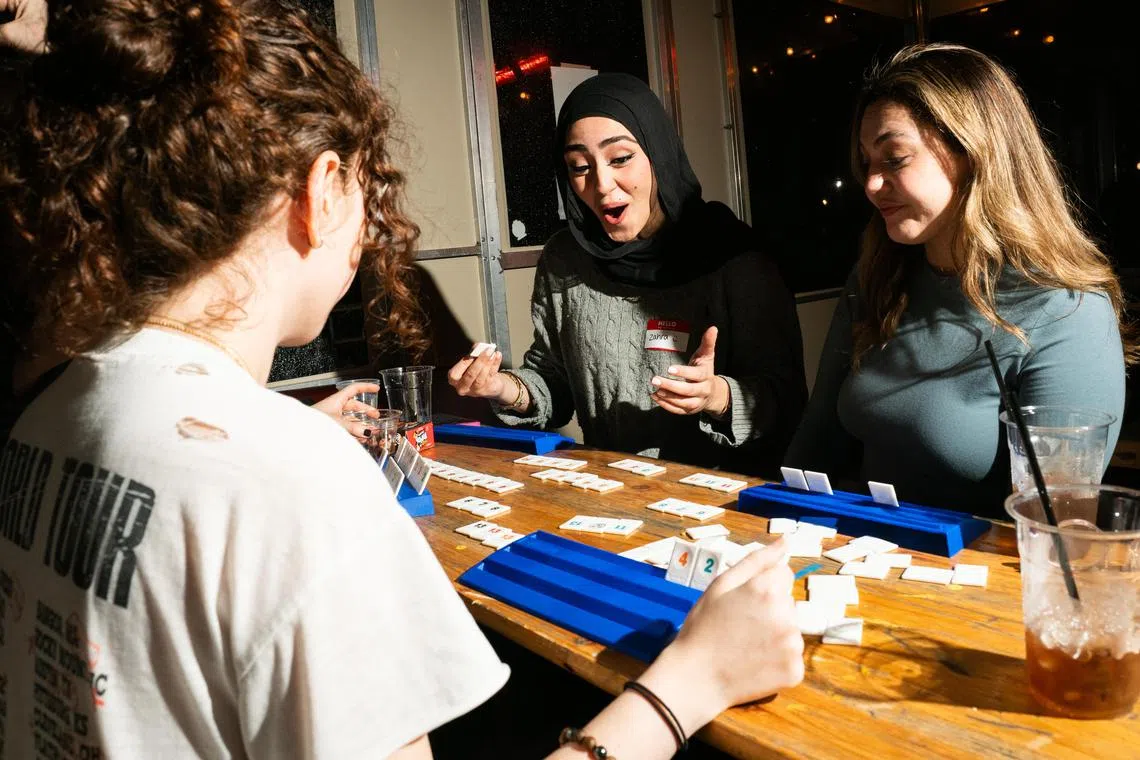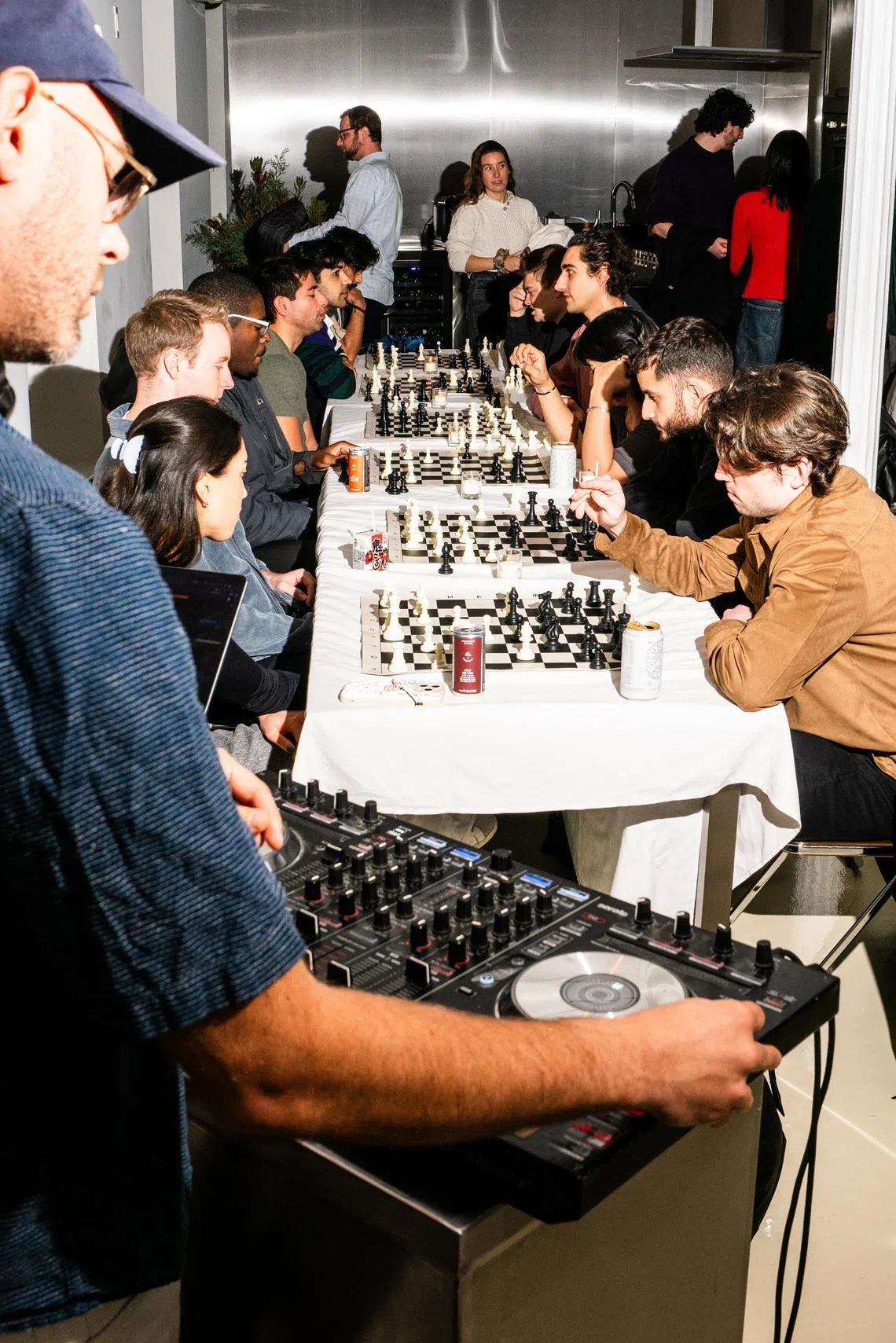The extremely offline joy of the board game club
Sign up now: Get ST's newsletters delivered to your inbox

As a DJ played music, board gamers play Rummikub during a meetup in Brooklyn's Williamsburg neighbourhood on Dec 10.
PHOTO: NYTIMES
UNITED STATES – When Ms Michelle Kong started a chess club in 2023, hoping to meet other players in their 20s, attendance was so meagre that she needed only one chessboard. She posted about the club on social media until a tattooed cross-section of young people in Los Angeles began showing up to exchange pawns and phone numbers.
Before long, boxes of triple-weighted bishops and rooks were piling up in the back seat of Ms Kong’s sedan. Last December, she upgraded the club’s home base from a cosy jazz bar to a warehouse that was barely large enough to accommodate the 500 people who attended the Thursday night meetings of the group, LA Chess Club, this summer.
“It kind of blew up,” said Ms Kong, 27, who is in urgent need of a place to store 200 chessboards.
Staring down an epidemic of loneliness, people in their 20s and 30s are gathering to play chess, backgammon and mahjong in the hope that old-fashioned game clubs might help ease the isolation and digital overload that weigh heavily on their generation.
Many have already been experimenting with more physical alternatives to doomscrolling like pickleball and running clubs. But organisers like Ms Kong say that the kind of board games stored in their grandparents’ attics are hot among Gen Zers and millennials hungry for less athletic modes of socialisation.
“A running club sounds like absolute torture to me,” said Ms Victoria Newton, 35, who has been hosting Knightcap Chess Club events in Austin, Texas, since July. “I have found that it’s easier to connect with someone when I’m not trying to catch my breath or covered in sweat.”
Board game sales in the United States surged more than 30 per cent from 2019 to 2020, fuelled by the Covid-19 pandemic, said Ms Juli Lennett, a toy industry adviser for Circana, a market research firm. Stuck at home and starved for social interaction, many Americans were able to rediscover the love of gameplay, she added.
The habit appears to have made it out of lockdown.
The number of board game events organised using the invitation service Partiful quadrupled in the past year, the company said. The number of groups related to board games on event-listing site Meetup increased roughly 10 per cent a year from 2021 to 2023.
Espresso martinis in hand, this wave of players seems eager to dispel the nerdy, stuffy or ultra-competitive reputations of game clubs past.
Mr Eduardo Rojer, 30, attracts players to his free Rummikub meetups in the Williamsburg section of Brooklyn through a colourful Instagram page where he posts memes about the tile game involving celebrities Charli XCX and Paris Hilton.
The monthly club has drawn around 80 people to each meeting since Mr Rojer started it in July, after having learnt the game from a friend and her mother during the early months of the pandemic.
“From what I hear, it’s something you used to play with your grandma,” he said. “I wanted to make this game kind of hot and relevant.”
Back to basics
Young people are only several thousand years late to the board game boom.
Tabletop games are about as old as civilisation itself, said associate professor Zachary Horton at the University of Pittsburgh who studies games. But they may be especially attractive to a generation that is fully saturated by digital media, he said, and living in an acrimonious political era in which it can feel like different groups are playing by their own rules.
“The analogue game stubbornly insists on its own presence,” he said.
Formal clubs devoted to board games gained steam in the US in the 19th century, when wealthy men could meet for competitive play at the Mechanics’ Institute Chess Club in San Francisco and the Manhattan Chess Club in New York.
As different game styles became more popular, gatherings shifted too, Prof Horton said.
Role-playing games of the 1970s gave rise to Dungeons & Dragons groups, and board game cafes and bars proliferated in the early 2000s, catering to players of elaborate strategy games like Catan.

A DJ plays at a meeting of the Pawn Chess Club in an apartment on Canal Street in Lower Manhattan on Dec 10.
PHOTO: NYTIMES
But with more games to choose from than ever before – including video games – many young players are drawn to the classics. Among Gen Zers, Prof Horton said, “it couldn’t be a clearer or stronger movement towards analogue play”.
Ms Remington Davenport thinks that a sense of nostalgia is part of the draw of NYC Backgammon Club, the group she started in 2023 for young people to play a 5,000-year-old game many attendees learnt from their parents and grandparents.
The 35-year-old said she had felt out of place at the existing backgammon events that she had been able to find in New York City.
“I was really disappointed with the lack of women at these events, and the lack of people in their 20s and 30s,” she said.
More than 3,500 people in all have come to the frequent meetups that NYC Backgammon Club holds at restaurants in Brooklyn and Manhattan, she said. In April, she left her job in sales to focus on backgammon full time.
Other board game groups aim to help young people connect to the history of those who played before them.
Green Tile Social Club in New York and Mahjong Mistress in Los Angeles are aiming to help the next generation learn to play mahjong, a tile game that is believed to have originated in China in the 19th century, but has long been played throughout Asia.
Mahjong Mistress – made up of Ms Angie Lin, 33; Ms Abby Wu, 27; Ms Susan Kounlavongsa, 38; and Ms Zoe Blue, 30 – holds meetups every couple of months that cost US$15 (S$20) to US$25 and often draw hundreds of people. The hosts organise Chinese New Year parties and mahjong matchmaking nights where enthusiasts can flirt while discussing the specifics of Japanese versus Taiwanese mahjong.
“People are looking for wholesome activities,” Ms Lin said, pointing to data that Gen Z is consuming less alcohol than older generations. Well, mostly wholesome. “Our first singles night, we had two people making out at the end of it.” NYTIMES


